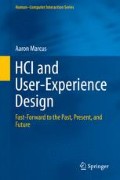Abstract
A funny thing happened to me on the way to writing this chapter. I began to ask myself, what exactly constitutes fun in the user-experience of products and services?
Originally, copyright © 2007 by Aaron Marcus and Associates, Inc.
Access this chapter
Tax calculation will be finalised at checkout
Purchases are for personal use only
References
Publications
Aries P (1962) Centuries of childhood: a social history of family life. Random House, New York
Arnold P (1985) The book of games. Exeter Books, New York
Csikszentmihalyi, Mihaly (1990) Flow: the psychology of optimal experience. Harper and Row, New York
DeKoven BD (1978) The well-played game: a player’s philosophy. Anchor Books, New York
Fowler G, Steinberg B, Patrick AO (2007) Mac and PC’s overseas adventures: globalizing apple’s ads meant tweaking characters, clothing and body language. Wall Street Journal, p. B1ff
Gardner H (1985) Frames of mind, the theory of multiple intelligences. Basic Books, New York. ISBN 0465025102
Hesse H (1949) Magister Ludi. Frederick Ungar Publishing Co., New York
Huizinga J (1950) Play orbit: a study of the play element in culture. Roy, New York, p 220
Karnitschnig M (2007) Comedy central export aims for local laughs: viacom’s german channel is part of plan to establish global brand to join MTV. Wall Street Journal, p B1ff
Lieberman GF (1975) 3,500 good jokes for speakers. Doubleday, New York
Mosston M, Ashworth S (2002) Teaching physical education 5. Pearson Education, New Jersey
No Author (2007) Let’s get physical: videogames: ‘excergaming” which combines on-screenaction with physical exercise, shows that gamers need not be couch potatoes. The Economis Technology Quarterly, pp 6–7. See also, http://www.ebusinessforum.com/index.asp?layout=rich_story&channelid=3&categoryid=9&doc_id=10271. Checked 13 Mar 2007
Paulos JA (1980) Mathematics and humor. Chicago University Press, Chicago
Pentagram Design Ltd (1990) Pentagames. Fireside, New York
Prochnow HV (1942) The public speaker’s treasure chest: a compendium of source material to make your speech sparkle. Harper and Brothers, New York
Sackson S (1969) A gamut of games. Pantheon Books, New York
The Diagram Group (1974) Rules of the game. Bantam Books, New York
The Diagram Group (1975) The way to play. Bantam Books, New York
The Diagram Group (1982) The sports fan’s ultimate book of sports comparisons. St Martin’s Press, New York
Tierney J (2007) What’s so funny? Well, maybe nothing. New York Times, 13 March 2007, p D1ff
Turner (1982) Victor from ritual to theatre: the human seriousness of play. PAJ Publications, New York
URLs
http://www.almaden.ibm.com/cs/npuc2001/. IBM NPUC conference on games
http://www.deepfun.com/masterclass.html. DeKoven’s “master class in fun”
http://www.deepfun.com/about.html, background about DeKovenBernie
http://www.deepfun.com/funflow.htm. DeKoven’s article about flow and fun (citing Csikzsentmihalyi)
Author information
Authors and Affiliations
Rights and permissions
Copyright information
© 2015 Springer-Verlag London
About this chapter
Cite this chapter
Marcus, A. (2015). Fun! Fun! Fun! In the User Experience. In: HCI and User-Experience Design. Human–Computer Interaction Series. Springer, London. https://doi.org/10.1007/978-1-4471-6744-0_33
Download citation
DOI: https://doi.org/10.1007/978-1-4471-6744-0_33
Publisher Name: Springer, London
Print ISBN: 978-1-4471-6743-3
Online ISBN: 978-1-4471-6744-0
eBook Packages: Computer ScienceComputer Science (R0)

